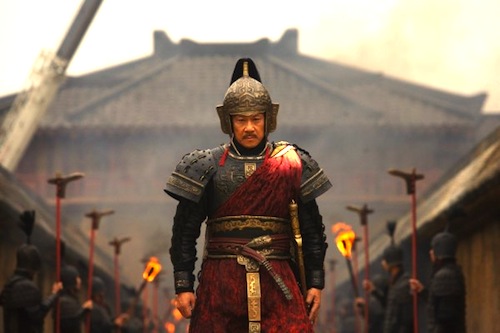By Govindini Murty. As regular Libertas readers know, one of our favorite films from Sundance 2012 was Mads Brügger’s scandalous and politically incorrect documentary The Ambassador. In it, Brügger impersonates a diplomat and travels to the Central African Republic to uncover rampant corruption. Now you can finally see the film yourself, because The Ambassador was recently picked up for distribution by Drafthouse Films.
As Libertas readers know, we did an in-depth Sundance interview with Mads Brügger earlier this year at The Huffington Post, in which we declared Mads “the most provocative filmmaker in the world.” We chose our words about Mads carefully, because we do think he may just be “the most provocative filmmaker in the world.” It would be hard to find another filmmaker like Mads who is willing to risk his life to expose tyranny – and yet who also has the intelligence and ironic sense of humor to know how to satirize that tyranny on-camera. As Drafthouse Films’ recent press release says:
Drafthouse Films, the film distribution arm of the world-famous Alamo Drafthouse Cinema, announced their acquisition of The Ambassador, a darkly comic, genre-bending documentary that exposes the corrupt business of selling diplomatic titles to exploit the lucrative and limited resources of war torn, third world nations. Filmmaker/journalist/provocateur Mads Brügger (Sundance Grand Jury Prize winner for Red Chapel) uses humor in his jaw-dropping descent into one of the most dangerous places on the planet: Central African Republic. From each absurdly terrifying and hilarious situation to the next, The Ambassador is a one-of-a-kind excursion from the man whom The Huffington Post has called “the most provocative filmmaker in the world.”
The Ambassador is scheduled to launch on VOD and digital platforms August 4th and theatrically in New York City (IFC Center) on August 29th, Los Angeles (The Cinefamily) and Austin (Alamo Drafthouse locations) on August 31st. The film will also be available through iTunes on August 24th.
Brugger’s prior film, The Red Chapel, was a striking expose of communist North Korea for which Brugger won the Sundance Grand Jury Prize in 2010. In that film, Brügger infiltrated North Korea by pretending to be part of a Danish communist theater troupe – when in reality he was only there to ‘punk’ the North Korean regime.
Again, here’s our Huffington Post interview with Brügger in which we discuss all this and more. We wish Mads and Drafthouse Films the best with their release.
Posted on July 23rd, 2012 at 10:02pm.





